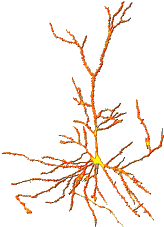|
|
|
|
Susan Y.
Bookheimersbook@ucla.edu
Los Angeles, CA
90095
United States
Susan Bookheimer's Website
Center for Cognitive Neuroscience
CV
NIH Biosketch
NSF Biosketch
|
 |
Keywords:
language, memory, autism, development, alzheimer's, aging, neuropscyhology, fMRI, surgery
Statement:
Imaging in Development
In only a few years, a child's brain transforms from one that is able to do little more than eat, sleep and wiggle, to one with profoundly sophisticated abilities of language, intellect, and creativity. What dramatic changes must take place in the brain for all of this to develop! Yet, until recently, there were few methods to understand how the brain matures normally or exceptionally. New achievements in brain imaging technologies, in particular, the invention of functional Magnetic Resonance Imaging (fMRI) has given us the first window into the developing human brain. Functional MRI allows us to see not just the structure of the brain, but how the brain is working during cognitive tasks. Because it is both safe and completely non-invasive, we can use fMRI to observe the brain function of children, following them through their intellectual growth. With advanced statistical tools, we can learn how different brain regions work, communicate with each other, and how they change as children develop. This technology allows us to understand how the developing child differs from children who are not"typical"?- children with developmental disabilities, difficulty in reading (dyslexia) or with social skills (Autism or Asperger's disorder), as well as children with exceptional abilities- the highly creative and gifted.
Developmental Disorders
Our lab uses fMRI to study brain activity in children who differ from the "norm"?. Two of our programs focus on children with disabilities. Dyslexia is a very common reading disorder that likely has multiple causes and manifestations. Our dyslexia program explores the brain activity in children whose reading abilities do not match their intellectual potential. These studies attempt to identify unique brain activity "signatures"? that represent different underlying causes of dyslexia. Such research should help us design treatments that are optimized for each child's unique strengths and weaknesses.
Our autism project, part of a consortium with collaborators throughout the U.S., uses fMRI to understand how the brain learns social communication skills and how these skills are impaired in children with autism and Asperger's disorder, a form of mild autism. Such children may be intellectually normal or even advanced, but lack the ability to understand social nuances, relate to peers, and form strong emotional bonds. This work explores how the brain learns to respond to facial emotion, tone of voice, and non-verbal communication, and how these skills can develop abnormally. Our results may help us find ways to intervene in these difficult disorders and to suggest better educational environments for such children.
Exceptional Children
One area of great interest in our lab is the study of highly gifted and creative children. Many of these children have an unusual mix of abilities and disabilities: highly intellectual, but with attention problems (ADHD); exceptional mathematical skills, but difficulty making friends; tremendously artistic, but poor or average reading ability. Exceptional children are studied rarely, because the primary funding agency for pediatric research (NIH) prefers to support research on disease states and disorders, leaving exceptional children ignored. Unfortunately, our school systems are poorly equipped to deal with children who are on either end of the spectrum, so that these children receive little attention in the educational or healthcare system. Consequently, current science knows almost nothing about what makes these children different, what it is about their brains that drives these differences, and how educators and parents can best meet their special needs and nurture their abilities. We are eager to develop opportunities to engage in such research in our lab.
|
|
|
|
|
|
|
I sincerely apologize that we have a long-standing and unresolved problem that users are unable to modify the database contents using their logins and passwords. I hope that we can fix this problem soon. In the meantime, I will try to do this manually as best I can.
We encourage you to add your own name to this list (without obligation or cost...).
You may use this list to let others know of your interests, your contact information, your biographical and professsional history.
FAQ and HELP
|
|
|
|
|



